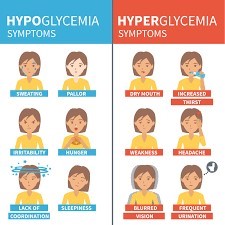A nurse is providing teaching to a client who has a new diagnosis of type 1 diabetes mellitus. The nurse should instruct the client to monitor for which of the following findings as a manifestation of hypoglycemia?
Irritability
Increased urination
Vomiting
Facial flushing
The Correct Answer is A
Irritability.

The rationale for each choice is as follows:
- A. Irritability: Correct. Irritability is one of the signs of hypoglycemia, which occurs when blood glucose levels fall below 70 mg/dL (3.9 mmol/L). Other signs include shakiness, sweating, hunger, headache, confusion, and blurred vision.
- B. Increased urination: Incorrect. Increased urination is one of the signs of hyperglycemia, which occurs when blood glucose levels rise above 180 mg/dL (10 mmol/L). Other signs include thirst, dry mouth, fatigue, nausea, and fruity breath odor.
- C. Vomiting: Incorrect. Vomiting is not a specific sign of hypoglycemia or hyperglycemia, but it can occur as a complication of either condition if left untreated or poorly managed.
- D.Facial flushing: Incorrect. Facial flushing is not a sign of hypoglycemia or hyperglycemia, but it can occur as a side effect of some medications used to treat diabetes, such as niacin or rosiglitazone.
Nursing Test Bank
Naxlex Comprehensive Predictor Exams
Related Questions
Correct Answer is B
Explanation
- A. Incorrect. Withholding pain medications for 24 hr after the old patch is removed is a harmful action that could cause severe withdrawal symptoms and uncontrolled pain for the client. The nurse should respect the client's right to refuse treatment and explore the reasons for their decision.
- B. Correct. Asking another nurse to witness the disposal of the new patch is a safe and legal action that follows the policies and procedures for handling controlled substances. The nurse should document the disposal of the new patch and report it to the appropriate authority.
- C. Incorrect. Sealing the patches in a plastic bag and placing them in the client's trash basket is an unsafe and illegal action that could lead to diversion, misuse, or accidental exposure of fentanyl to others. The nurse should dispose of the patches in a secure and designated container that prevents access by unauthorized persons.
- D. Incorrect. Sticking the two patches to each other and placing them in the sharps bin is an unsafe and improper action that could cause contamination, injury, or infection to others who handle or dispose of sharps waste. The nurse should dispose of the patches separately and carefully, avoiding contact with their adhesive surfaces.
Correct Answer is A
Explanation
A is correct because ginger tea is an herbal remedy that has been shown to reduce nausea and vomiting in pregnancy.
B is incorrect because ginger tea does not have any effect on breast tenderness, which is a common symptom of pregnancy caused by hormonal changes.
C is incorrect because ginger tea does not have any effect on headaches, which can be caused by various factors such as dehydration, stress, or caffeine withdrawal in pregnancy.
D is incorrect because ginger tea does not have any effect on urinary frequency, which is a common symptom of pregnancy caused by increased blood volume and pressure on the bladder.
Whether you are a student looking to ace your exams or a practicing nurse seeking to enhance your expertise , our nursing education contents will empower you with the confidence and competence to make a difference in the lives of patients and become a respected leader in the healthcare field.
Visit Naxlex, invest in your future and unlock endless possibilities with our unparalleled nursing education contents today
Report Wrong Answer on the Current Question
Do you disagree with the answer? If yes, what is your expected answer? Explain.
Kindly be descriptive with the issue you are facing.
